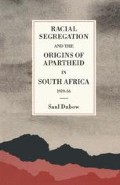Abstract
From the start Hertzog’s Native Bills were extensively discussed within extra-parliamentary political circles. A range of white and African political groupings gave evidence to specially constituted Select Committees, produced memoranda and submitted countless representations to government. Certain common themes are discernible in this plethora of evidence. For the most part the response of the extra-parliamentary opposition was to (i) welcome the Native Council Bill (with amendments), (ii) insist on a more generous land provision for Africans and (iii) reject the proposed abolition of the Cape African franchise. Hertzog was repeatedly asked to abandon his insistence on the interdependence of the Bills so as to consider them on their individual merits. However, segregation was rarely rejected out of hand. Far more often, groups and individuals argued within the parameters of segregationist discourse in the hope of securing an amenable compromise. The stress laid by most political groupings on maintaining responsible dialogue with the government meant that by 1936 very few organisations, either white or black, could claim not to have participated in the segregationist process.
Access this chapter
Tax calculation will be finalised at checkout
Purchases are for personal use only
Preview
Unable to display preview. Download preview PDF.
Notes and References
For Selope Thema’s views, see Ibid., evidence on behalf of Johannesburg Joint Council; also his ‘In Defence of the Cape Franchise’, in The South African Outlook, 1 September 1928. For Plaatje, see B. Willan, Sol Plaatje. A Biography (Johannesburg, 1984).
See, e.g. D. D. T. Jabavu’s ‘Native Disabilities’ in South Africa (Lovedale, [1932]); Native Taxation (Lovedale, [1932]).
W. Beinart and C. Bundy, Hidden Struggles in Rural South Africa. Politics and Popular Movements in the Transkei and Eastern Cape 1890–1930 (Johannesburg, 1987), p. 34.
Peter Walshe, The Rise of African Nationalism in South Africa. The African National Congress 1912–1952 (London, 1970), p. 54.
P. L. Wickins, The Industrial and Commercial Workers’ Union of Africa (Oxford, 1978), p. 66.
R. Elphick, ‘Mission Christianity and Interwar Liberalism’, in J. Butler et. al., Democractic Liberalism in South Africa. Its History and Prospect (Connecticut and Cape Town, 1987).
For a sympathetic account of the Joint Council movement, see J. W. Horton, ‘South Africa’s Joint Councils: Black-White Cooperation between the two World Wars’, in the South African Historical Journal, no. 4, November 1972. A critical account of the Joint Councils’ role in damping down African radicalism is to be found in Baruch Hirson’s ‘Tuskegee, The Joint Councils and the All African Convention’ (ICS Collected Seminar Papers, London University, X, 1981).
Joint Council of Europeans and Natives, General Hertzog’s Solution of the Native Question. Memorandum no. 1 (Johannesburg [1927]) (on the Natives’ Land Act 1913, Amendment Bill, 1927); General Hertzog’s Solution of the Native Question. Memorandum no. 2 (Johannesburg [1927]) (on the Union Native Council Bill, 1927 and Representation of Natives in Parliament Bill, 1927).
Sir James Rose Innes, The Native Franchise Question (Cape Town, 1929). This speech was read to the opening meeting of the NRFA. See Cape Times, 23 May 1929.
J. W. Jagger and Sir Clarkson Tredgold, The Native Franchise Question (Cape Town, 1930), p. 4.
See also H. Burton, The Native Franchise Question (Cape Town, 1930).
W. K. Hancock, Survey of British Commonwealth Affairs Vol. II Part 2 (London, 1942), p. 8.
J. D. Rheinallt Jones, ‘Cape Franchise and Bantu Status’, in The South African Outlook, 1 September 1928, pp. 166–7.
Johannesburg Joint Council, In Defence of the Cape Franchise. Memorandum no. 4 (Johannesburg, n.d., [1928]).
E. H. Brookes, ‘General Hertzog’s Native Franchise Proposals’, in Cape Times, 12–15 February 1930. Henry Burton criticised Brookes’s proposal as ‘unworkable’ in his Native Franchise Question, p. 13.
On ‘constructive segregation’, see Hofmeyr’s ‘The Approach to the Native Problem’, Journal of the Royal African Society, XXXVI, 144, 1937.
See, e.g. Cape Times, 18 February 1929 ‘Facts and Figures’ (editorial); Cape Times, 20 February 1928 ‘Cape Native Voters’ (editorial); Cape Times, 25 February 1929; J. H. Pirn, ‘The Native Bills’, in The South African Outlook, 2 April 1928.
T. Karis and G. M. Carter, From Protest to Challenge Vol. 1, (Stanford, 1972), p. 49.
R. J. Haines, ‘The Opposition to General Hertzog’s Segregation Bills, 1929–36: A Study in Extra-Parliamentary Protest’ (MA thesis, University of Natal, 1978), pp. 290, 288.
M. L. Legassick, ‘Race, Industrialization and Social Change in South Africa: The Case of R. F. A. Hoernlé’, African Affairs, LXXV, 299, 1976, 237–8. See also Hirson, ‘Tuskegee, The Joint Councils and the All African Convention’.
Copyright information
© 1989 Saul Dubow
About this chapter
Cite this chapter
Dubow, S. (1989). The Passage of Hertzog’s Native Bills, Part Two. In: Racial Segregation and the Origins of Apartheid in South Africa, 1919–36. St Antony’s. Palgrave Macmillan, London. https://doi.org/10.1007/978-1-349-20041-2_7
Download citation
DOI: https://doi.org/10.1007/978-1-349-20041-2_7
Publisher Name: Palgrave Macmillan, London
Print ISBN: 978-1-349-20043-6
Online ISBN: 978-1-349-20041-2
eBook Packages: Palgrave History CollectionHistory (R0)

